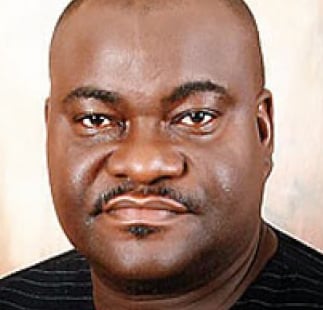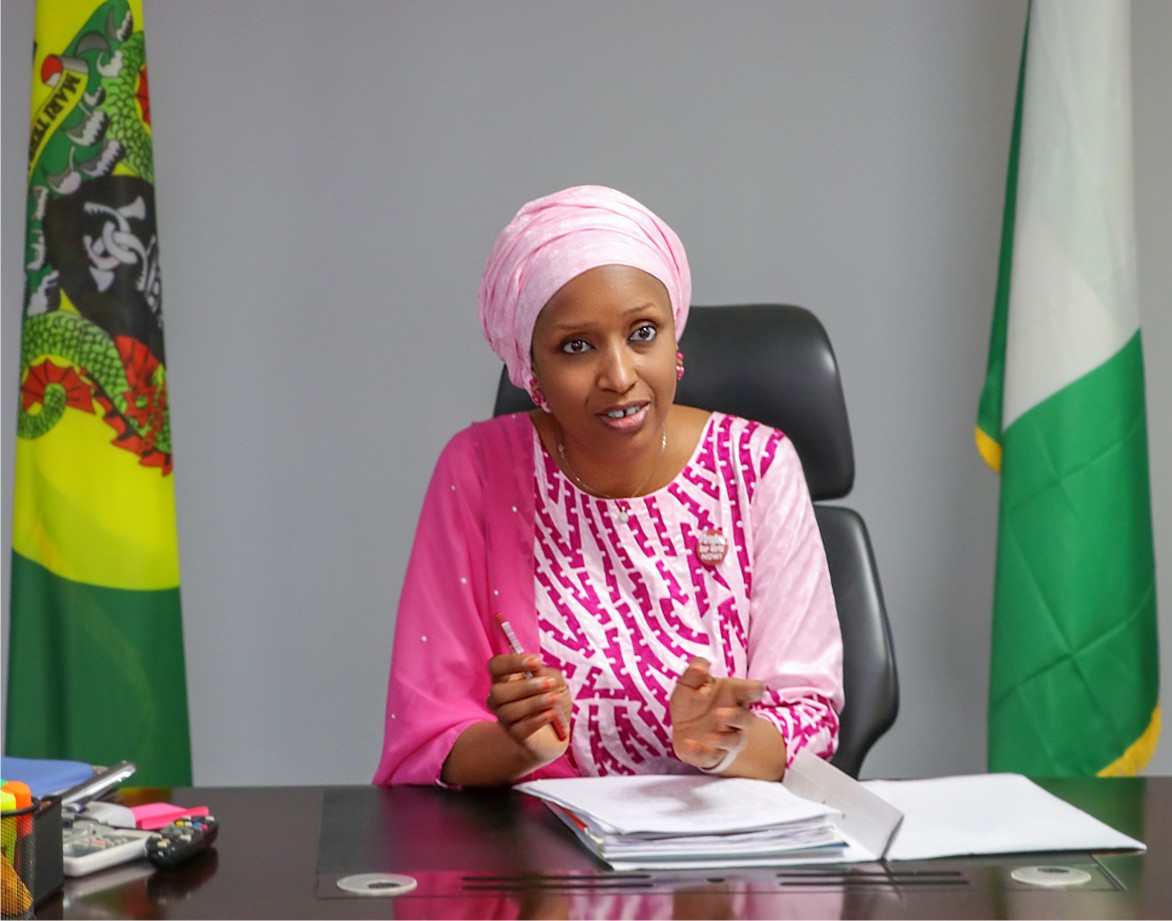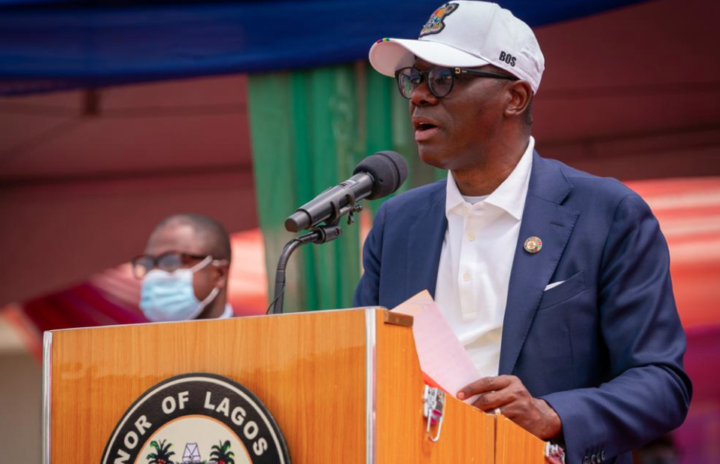The Nigerian media was in overdrive a fortnight ago after news of the suspension of Hadiza Bala Usman, from her job as Managing Director of the Nigerian Ports Authority, NPA, went public. Usman had been asked to step aside on the orders of President Muhammadu Buhari. Buhari acted on the recommendation of Usman’s supervising minister, Rotimi Amaechi, who is in charge of the Federal Ministry of Transportation. Amaechi, by the way, is said to be one of the select Ministers serving in the Buhari government who has access to him. Most others depend on go-betweens to feel his pulse on issues, official and otherwise.
Usman has been something of a “special child” in the incumbent administration. Naturally therefore, postulations and propositions were thrown up about the locus of her sudden ouster. For one, she was one of the young turks at the forefront of the campaign for the election of Buhari in 2015. She served as Administrative Secretary of the Buhari Campaign Organisation. She was also Member/Secretary of the election planning committee of the campaign. In these capacities, she worked closely with Amaechi who was the Director-General of the Campaign.
Having enjoyed a long-term official association with Nasir El Rufai, governor of Kaduna State, her first job in the Buhari dispensation was as Chief of Staff to the Kaduna State chief executive, in 2015. It was from this position that she was catapulted to the position of MD of NPA, beginning from 2016. Indeed, President Buhari renewed her appointment for a fresh term, a few months ago, which made her removal from office even more curious.
Amaechi’s correspondence to the President seeking her disengagement was based on the allegation that remittances to the federal government’s Consolidated Revenue Fund, CRF, for the years 2016 to 2020, by the NPA, fell short by N165 Billion. He thus prayed the President for approval to institute an audit of the organisation for the four years under review.
Advertisement
An acting chief executive, Mohammed Koko, who until Usman’s suspension was Executive Director, Finance and Administration in the organisation, has since been appointed. An investigative panel chaired by the Director, Maritime Services in the parent ministry has also been constituted.
Conjectures and more conjectures have been thrown up about the root cause of the recent no-love-lost relationship between Amaechi and his erstwhile favourite, Usman. One school of thought has advanced that Hadiza Bala Usman in recent months, had been playing the ethno-religious card, jettisoning her minister and deploying her Fulani network in the administration, to deal directly with the President. It has been alleged that the recent renewal of her mandate as NPA boss was without the imprimatur of her minister, Amaechi.
It has also been proposed, that the hitherto chummy relationship between Amaechi and El Rufai, had broken down. The names of both men have featured regularly in some circles, as a likely pairing for the 2023 presidential ticket. There are murmurs to the effect that Usman’s recent defiance of her Principal Amaechi, has been covertly endorsed by El Rufai, who like Usman is Fulani.
Advertisement
There is yet a third postulation to the effect that Usman momentarily forgot she was an appointee of the government when she chose, in a recent tweet on her twitter account, to upbraid the administration on the spate of insecurity in the country. She had said inter alia: *The state of insecurity in the country that has led to the kidnap of the Kagara boys and the Zamfara girls, needs to be addressed URGENTLY…We can’t go on like this. Rescue our children and secure our country that’s all we ask!*
Before her advent as a top official of the Buhari regime, Usman was an activist and co-convener of the “Bring Back Our Girls Campaign,” a public advocacy which was launched in the twilight of the government of former President Goodluck Jonathan, in the aftermath of the abduction of over 200 female students from a boarding school in Chibok, Borno State. It would seem Usman was torn in between the fact of being a public officer on one hand, and being a critic of a government in which she was serving, a government which is prickly about dissent and criticism.
We will yet return to the issues in this preamble sometime. The crux of this piece, however, is the subtext of Minister Amaechi’s correspondence to President Buhari, which empowered him to move against his former protege, Hadiza Bala Usman and the broader implications for governance and management under the subsisting administration.
Amaechi’s missive was a three paragraph letter, barely half a page, in which he summed up the infractions committed by Usman which resulted in her being shoved aside. It was dated March 4, 2021 and addressed to the President. Between the heading of the letter and the second line of the body of the correspondence, the word *remittance* turns out with two spellings. In one breath it is spelt “remmitance” which is wrong, in another breath it is represented as “remittance” the correct spelling.
Advertisement
When I drew the attention of a friend to the two conflicting spellings of the same word, he retorted “but the minister didn’t write the letter, it was drafted for him.” Amaechi himself knows that this alibi is not tenable. The moment he signed the letter, he had assumed ownership of every speck on the page. Amaechi is indeed more culpable because he is a graduate of English of 34 years standing now, from the University of Port Harcourt. Importantly, this is a document which is addressed to the President and which should be presented with impeccable correctness as much as possible.
From March 4, 2021, when it was received in the State House, it took two full weeks for it to be treated by the President. To be sure, assent to the letter was given on March 17, 2021. Just in case the issue raised was one of urgent importance, it would have been overtaken by events by the time it is actioned. Mr President himself did not acquit himself properly when he minuted “Your above prayers is approved.” Amaechi’s singular request was for authorisation to carry out an audit of NPA from 2016 to 2021. That cannot translate to “prayers.”
The letter to Amaechi forwarding the President’s approval was dated March 17, 2021. It was signed by the Chief of Staff, Prof Ibrahim Agboola Gambari. The letter, however, was only received by the Minister on March 30, 2021. This implies that it took another two weeks from the date of presidential assent, for the document to crawl to the Federal Ministry of Transportation. Amaechi minuted the document to the Permanent Secretary on the same day, March 30, 2021, for him to “handle.”
It was not until May 7, 2021, however, that the President’s approval of Minister Amaechi’s request, was communicated to Hadiza Bala Usman. The import of this is that processing this singular document took two long months and three days, beginning from the date it was submitted on March 4, 2021!
Advertisement
Quite a number of things are wrong here, which might explain the unpardonable tardiness which attends official action on issues under the incumbent government. Under the administration of President Olusegun Obasanjo which I served, it was never the responsibility of the Chief of Staff to convey approvals or presidential minutes on documents.
The President’s official secretariat next door to his office, processes and transmits incoming and outgoing correspondences. Between 1999 and 2007, that office was headed by an officer designated as *Special Assistant to the President on Administration,*” SAP Administration” for short. Under the administration of Umaru Yar’Adua, the position was upgraded to that of *Senior Special Assistant on Administration* to the President. He conveyed approvals, comments, directives and minutes as the case may be, to the originating or relevant Ministry, Department or Agency, MDA.
Advertisement
The Special Assistant to the President on Administration also copied the supervising Minister of the MDA; the Secretary to the Government of the Federation, SGF; the Chief of Staff, COS and the file. He was assisted by about four officers in the rank of “Personal Assistant” to President. There were also mail men and drivers for the ease and immediacy of delivery of documents. The SAP Administration equally arranged documents and files into the briefcases of the President, in the event that he chose to work from his private study in his residence later in the day. The President’s briefcases are similarly tended to, if the President was travelling for a few days, so he could keep working.
The Chief of Staff should ordinarily be too busy attending to other crucial matters of state and ensuring optimum functioning of the staff of the President, for him to be engaged in transmitting official documents. There must be files and files in the State House archives, of documents treated since the advent of democratic governance in 1999, for reference purposes.
Advertisement
And how on earth will it take a correspondence a whopping two months from the date of submission, to the date of reversion to the originator? What if it were an emergency, a make or break scenario? What is the feedback mechanism in place, to enable public servants trace and track their submissions to the President? It is clear that the governance system under this administration is not working the way it should be. This is why Nigerians hear a lot more from proxies, simulating alibis and the attendant knee jerk reactions, than the nation’s Number One citizen who they voted for.
That it took two long months to process a three paragraph document, is symptomatic of everything that is wrong with this government. It is indeed an unacceptable sampler of how not to run a government. It speaks loudly to the gaping lacuna of top notch human capacity in the engine room of the administration, in a country that is so blessed. It unveils the glaring lack of institutional memory to guide and direct the wheels of government. It is symptomatic of the absence of pace and traction in the conduct of the business of governance. It exposes the absence of inbuilt regulatory mechanisms in the maze of public administration.
Advertisement
The investigation of Hadiza Bala Usman by the panel set up by the Minister of Transport may proceed apace. The administration of President Buhari, however, needs to take a retrospective, holistic look at itself and reinvent itself. How much can be done with barely two years to the expiration of this administration, with the national space already dominated by politicking and sloganeering ahead of 2023, remains to be seen.
* Tunde Olusunle, PhD, poet, journalist and scholar, is a former presidential aide.
Views expressed by contributors are strictly personal and not of TheCable.
Add a comment







